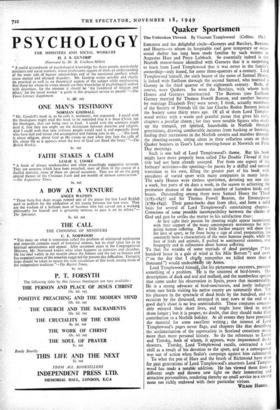Quaker Sportsmen
The Unbroken Thread. By Viscount Templewood (Collins. 15s.) EARLHAM and the delightful circle—Gurneys and Barclays, Buxton; and Hoares—to whom its hospitable roof gave temporary or occa- sional shelter has long been made familiar by such writers Augustus Hare and Percy Lubbock. So essentially indeed is the Norfolk manor-house identified with Gurneys that it is surprising to learn from Lord Templewood that it was never in the family', ownership—only leased, for some three-quarters of a century. Loid Templewood himself, the sixth bearer of the name of Samuel Hoai:, is linked with Earlham through the second Samuel, who married a Gurney in the third quarter of the eighteenth century. Both, oi course, were Quakers. So were the Barclays, with whom bush Hoares and Gurneys intermarried. The Buxtons (one Earlham Gurney married Sir Thomas Fowell Buxton, and another becaniz by marriage Elizabeth-Fry) were never, I think, actually membo:i of the Society of Friends till the late Charles Roden Buxton joined the Society some thirty years ago. Of all of them Lord Temp;,:- wood writes with a warm and grateful pietas that gives his ear!; chapters a peculiar charm ; for they were notable figures who mad: up the tranquil, yet spirited, households in Norfolk through generations, drawing comfortable incomes from banking or brewing, finding their recreations in the Norfolk coverts and marshes through the shooting-season, sitting silent in their collarless coats or their Quaker bonnets in Goat's Lane meeting-house at Norwich on First Day mornings.
Such is one half of Lord Templewood's theme. But his book might have more properly been called The Double Thread if that title had not been already usurped. For from one aspect of his forbears' activities—the sporting—he passes by a skilful and natural transition to his own, filling the greater part of his book with anecdotes of varied sport with many companies in many lands. The early Hoares were tireless sportsmen, devoting not one day a week, but parts of six days a week, in the season to achieving the premature decease of the maximum number of harmless birds and beasts. Outstanding among them were Samuel Hoare the Third (1783-1847) and Sir Thomas Fowell Buxton, the Emancipator (1789-1845). Their game-books date from 1811, and form a solid basis for several of Lord Templewood's entertaining chapter:. Conscious of some possible incompatibility between the claims of God and gun he settles the matter to his satisfaction thus: At first sight their passion for shooting might appear inconsistent with their support of the many contemporary movements for miti- gating human suffering. But a little further enquiry will show that the love of sport, so far from being a sign of cruel propensities, has constantly been a characteristic of the most humane people, while the love of birds and animals, if pushed to sentimental extremes, may frequently end in callousness about human suffering.
To that The wraiths of some myriads of dead partridges (" five hundred brace in a gale of wind at Six Mile Bottom ") and coots (" on the day that I ch4 remember we . killed more than a thousand ") would undoubtedly say Lord Templewood himself, like his picturesque ancestors, presents something of a problem. He is the sincerest of bird-lovers. His descriptions of duck and teal and mallard, and the numberless species that came under his observation in Spain, prove that incontestably. He is a strong advocate of bird-sanctuaries, and justly indignant when rare birds visiting his native county are summarily shot. Yft his pleasure in the spectacle of dead birds by the hundred, and .,a occasion by the thousand, arranged in neat rows at the end Of a good day's shoot is no less unmistakable. These creatures conceiv- ably enjoyed their short lives, and might have liked to ernoy them longer ; but it is proper, no doubt, that they should make their contribution to a Norfolk holiday. At all events they have provided the material for some excellent writing ; the interest of 1.0:.1 Templewood's pages never flags, and chapters like that describm4 the acclimatisation of the capercailzie in Scotland constitute more than mere personal history. So do the references to Lena and Trotsky, both of whom, it appears, were impassioned thi-k- shooters. Trotsky, Lord Templewood recalls, contracted a chill as a result of his devotion to the sport, and as a consequer,e was out of action when Stalin's campaign against him culminat:d. To what the pen of Hare and the brush of Richmond have do .:ie for past generations of Lord Tcmplcwood's ancestors Lord Temp,e- wood has made a notable addition. He has viewed them from different angle and thrown new light on their interesting arid attractive personalities, rendering thereby no small service to a society none too richly endowed with their particular virtues.
WILSON HARRIS.














































































 Previous page
Previous page